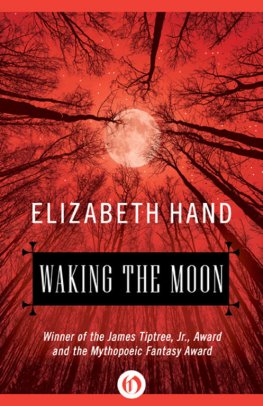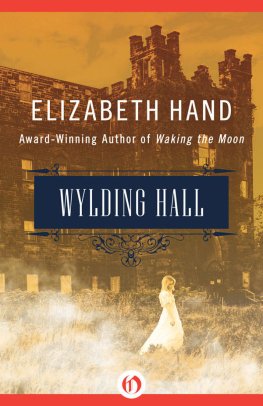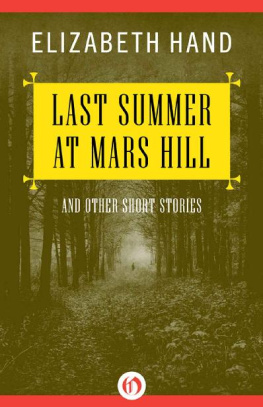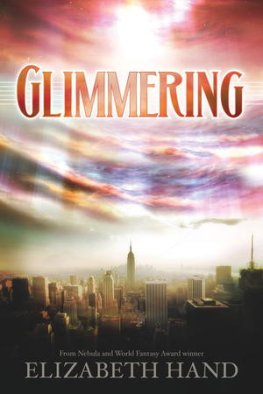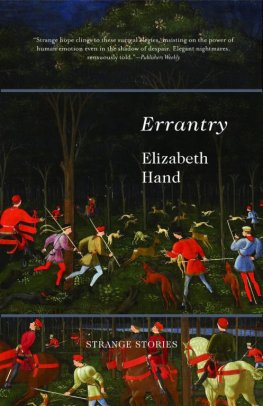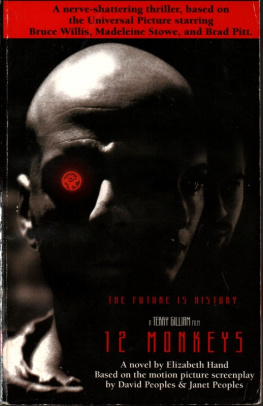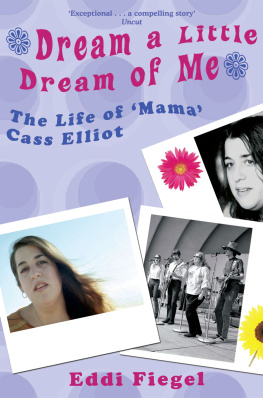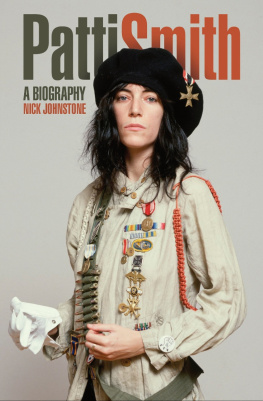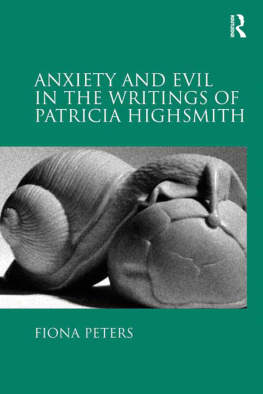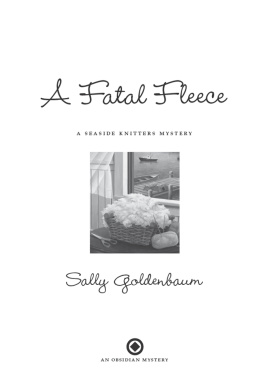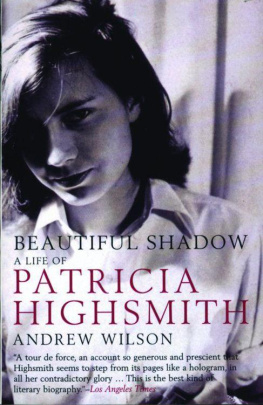Elizabeth Hand
GENERATION LOSS
Theres always a moment where everything changes. A great photographersomeone like Diane Arbus, or me during that fraction of a second when I was greatshe sees that moment coming, and presses the shutter release an instant before the change hits. If you dont see it coming, if you blink or youre drunk or just looking the other waywell, everything changes anyway, its not like things would have been different.
But for the rest of your life youre fucked, because you blew it. Maybe no one else knows it, but you do. In my case, it was no secret. Everyone knew Id blown it. Some people can make do in a situation like that. Me, Ive never been good at making do. My life, who could pretend there wasnt a big fucking hole in it?
I grew up about sixty miles north of the city in Kamensic Village, a haunted corner of the Hudson Valley where three counties meet in a stony congeries of ancient Dutch-built houses, farmland, old-growth forest, nouveau-riche mansions. My father wasisthe village magistrate. I was an only child, and a wild thing as the privileged children of that town were.
I had from earliest childhood a sense that there was no skin between me and the world. I saw things that other people didnt see. Hands that slipped through gaps in the air like falling leaves; a jagged outline like a branch but there was no branch and no tree. In bed at night I heard a voice repeating my name in a soft, insistent monotone. Cass. Cass. Cass. My father took me to a doctor, who said Id grow out of it. I never did, really.
My mother was much younger than my father, a beautiful Radcliffe girl he met on a blind date arranged by his cousin. She died when I was four. The car she was driving, our old red Rambler station wagon, went off the road and into the woods, slamming into a tree on the outskirts of town. It was an hour before someone noticed headlights shining through the trees and called the police. When they finally arrived, they found my mother impaled on the steering column. I was faceup on the backseat, surrounded by shattered glass but unhurt.
I have no memory of the accident. The police officer told my father that I didnt cry or speak, just stared at the cars ceiling, and, as the officer carried me outside, the night sky. Nowadays there would have been a grief counselor, a child psychologist, drugs. My fathers Irish Catholic sensibility, while not religious, precluded any overt emotion; there was a wake, a funeral, a week of visiting relatives and phone calls. Then my father returned to work. A housekeeper, Rosie, was hired to tend me. My father wouldnt speak of my mother unless asked, and, forty-odd years ago, one didnt ask. Her presence remained in the framed black-and-white photos my father kept of her in his bedroom. While Rosie vacuumed or made lunch I would sit on his bed and slowly move my fingers across the glass covering the pictures, pretending the dust was face powder on my mothers cheeks.
I liked being alone. Once when I was fourteen, walking in the woods, I stepped from the trees into a field where the long grasses had been flattened by sleeping deer. I looked up into the sky and saw a mirror image of the grass, black and yellow-gray whorls making a slow clockwise rotation like a hurricane. As I stared the whorl began to move more quickly, drawing a darkness into its center until it resembled a vast striated eye that was all pupil, contracting upon itself yet never disappearing. I stared at it until a low buzzing began to sound in my ears. Then I ran.
I didnt stop until I reached my driveway. When I finally halted and looked back, the eye was still there, turning. I never mentioned it to anyone. No one else ever spoke of seeing it.
My sense of detachment grew when I started high school, but as my grades were good and my other activities furtive, my father never worried much about what I did. Our relationship was friendly if distant. It was my Aunt Brigid who worried about me on the rare occasions she paid us a visit.
Brigid was like my father, stocky and big boned and red haired. I resembled photos of my mother. Tall and angular, narrow hipped, my mothers soft features honed to a knife-edge in my own. Pointed chin, uptilted nose, dirty-blond hair and mistrustful gray eyes. If Id been a boy I might have been beautiful. Instead I learned early on that my appearance made people uneasy. There was nothing pretty about my androgyny. I was nearly six feet tall and vaguely threatening. I wore my hair long but otherwise made no concessions to fashion, no makeup, no lipstick. I wore my fathers white shirts over patched blue jeans or mens trousers I bought at the Junior League Shop. I wouldnt meet peoples eyes. I didnt like people looking at me. It made me feel sick; it reminded me of that great eye above the empty field.
She looks like a scarecrow, Dad, Brigid said once when I was sixteen. She and her husband were in Kamensic for a rare visit. I mean, look at her
I think she looks fine, my father said mildly. Shes just built like her mother was.
She looks like a drug addict, Brigid snapped. She was sensitive about her weight. We see them out where we live.
I pointed out to the bird feeder at the edge of our woods. What, like the chickadees? We see them too, I said, and retreated to my room.
Several months later I had this dream. I was kneeling in the field where Id seen the eye. A figure appeared in front of me: a man with green-flecked eyes, his smile mocking and oddly compassionate. As I stared up at him, he extended his hand until his finger touched the center of my forehead.
There was a blinding flash. I fell on my face, terrified, woke in bed with my ears ringing. It was the morning of my seventeenth birthday. My father gave me a camera. I sat at the breakfast table, turned it in my hands, and remembered the dream. I saw my face distorted in the round glass of the lens, like a flaw; like an eye staring back at me.
* * *
I took an introductory photography class in high school and was encouraged to take more.
I never did. I quickly learned what I needed to know. I liked a slow lens. I liked grainy black-and-white film and never worked in color. I liked the detail work of creating my own photographic paper, of processing then developing the film myself in the school photo lab. I loved the way the paper felt, soft and wet in the trays, then the magical way it dried and turned into something else, smooth and rigid and shining, the images a mere byproduct of chemistry and timing.
I didnt care if the pictures were over- or underexposed, or even if they were in focus. I liked things that didnt move: dead trees, stones. I liked dead things: the fingerless soft hand of a pheasants wing, mouse skulls disinterred from an owl pellet, a cicadas thorax picked clean by tiny green beetles. I liked portraits of my friends when they were sleeping. Ive always watched people sleep. When I occasionally babysat, Id go into the childrens rooms after they were in bed and stand there, listening to their breathing, waiting until my eyes adjusted to the soft glow of nightlight or moonlight. I liked to watch them breathe.
When I was seventeen I fell in love with a boy from a neighboring village. He was a year younger than me, fey, red haired, with sunken, poison green eyes: a musician and a junkie. Id hitch to his town and sit on the library steps across the street from his big Victorian house and wait there for hours, hoping to see him but also wanting to absorb his world, clock the comings and goings of his younger siblings, parents, his golden retriever, his friends. I wanted to see the world he knew from inside his junkies skin, smell the lilacs that grew outside his window.
One day his sister came out and said, My brothers inside. Hes waiting for you to come over.


